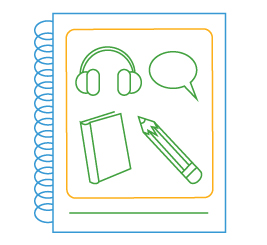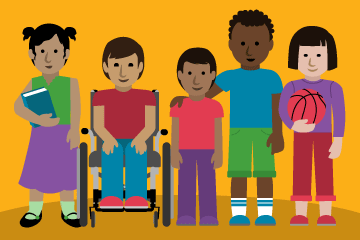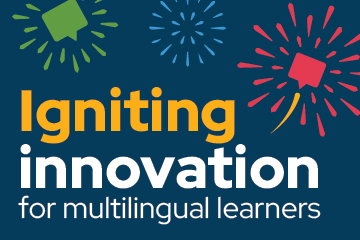Resources/Recursos
Featured Resources



All resources/Todos los recursos
2012 Amplification of the WIDA English Language Development Standards
The 2012 Amplification of the WIDA English Language Development Standards, Kindergarten-Grade 12, represented the social, instructional, and academic language students might need to engage with peers, educators, and the curriculum in schools. The 2012 Amplification included examples of how language could be processed or produced within a particular context through Model Performance Indicators (MPIs). MPIs were meant to be examples and not fixed guidelines of the language with which students may have engaged during instruction and assessment.
WIDA intends to fully retire the 2012 Amplification of the WIDA English Language Development Standards, Kindergarten-Grade 12. However, we recognize that all member SEAs have different timelines for implementation of the WIDA ELD Standards Framework, 2020 Edition. With that in mind, the 2012 Amplification will remain in the Resource Library so that educators whose SEAs are still using it may access it as needed.
Resource Details View Download NowA Case Study in Literacy Engagement with MLs
This video features Carmen, an elementary teacher in Minnesota. Even though she is required to teach from a prescribed curriculum, she still engages students in building personal connections to the text by connecting to students’ home literacy experiences and their emotions. Watch Carmen work with her small group of 2nd graders prior to reading a text on the lunar landing.
Resource Details
ACCESS for ELLs Interpretive Guide for Score Reports
This comprehensive document explains the types of scores reported by ACCESS for ELLs for students in kindergarten through grade 12.
Resource Details View Download NowACCESS for ELLs Parent Letters (multiple languages)
This letter, available in many languages, contains general information about ACCESS for ELLs and is meant to accompany ACCESS for ELLs score reports as an explanation for parents and guardians. It is provided in an editable format to allow districts and schools to include additional information regarding test administration dates and state policy.
Resource Details
ACCESS for ELLs: Understanding Your Child's Scores (multiple languages)
Send this flyer home with students along with the ACCESS for ELLs Individual Student Report. This flyer explains each piece of score information included in the report. Use this guide, available in several languages, to help parents understand what scores mean and how they are used.
Resource DetailsAction Research: A catalyst for comprehensive teaching and learning in multilingual contexts
This WIDA Snapshot introduces classroom action research – when researchers and educators work together to address classroom challenges – by encouraging teachers to use their researcher voices to make meaningful contributions to the field, whether through collaborative or independent approaches.
Resource DetailsAre We Ready? Districts and Programs Collaboration Guide and Notebook
The Are We Ready? Districts and Programs Collaboration Guide is for PreK-3 district and program leaders to use for reflection and planning connected to leading equitable transitions for multilingual children and their families. Use the Are We Ready? Districts and Programs Notetaker to write down your own ideas and transition plans.
See the Teaching in PreK-3 page for context.
Resource Details View Download NowAre We Ready? Educators Collaboration Guide and Notetaker
The Are We Ready? Educators Collaboration Guide is for PreK-3 educators to use for reflection and planning connected to promoting and providing equitable transitions for multilingual children and their families. Use the Are We Ready? Educators Notetaker to write down your own ideas and transition plans.
See the Teaching in PreK-3 page for context.
Resource Details View Download NowAre We Ready? Schools and Programs Collaboration Guide and Notetaker
The Are We Ready? Schools and Programs Collaboration Guide is for PreK-3 school and program leaders to use for reflection and planning connected to leading equitable transitions for multilingual children and their families. Use the Are We Ready? Schools and Programs Notetaker to write down your own ideas and transition plans.
See the Teaching in PreK-3 page for context.
Resource Details View Download NowBuilding on Students’ Cultural and Linguistic Assets
Many literacy programs were not designed to effectively use multilingual students’ knowledge, skills, and strengths. This Snapshot is the first in a five-part series that provides insights from relevant research and suggests ways to engage the significant strengths that multilingual learners bring to their literacy development.
Resource DetailsCan Do Philosophy (Video)
This video provides an overview of the WIDA Can Do Philosophy – the foundational belief that every learner brings valuable contributions to everything they do.
Resource DetailsConcept Tool: A Language-Focused Approach to Planning Equitable Learning Opportunities
A language-focused approach to planning applies an equity and language lens to the design of active and engaging learning opportunities for young children. Explore this tool to learn more about the what, how and why of a language-focused approach to planning equitable learning opportunities for multilingual children.
Resource Details View Download NowCreating a Reader Portrait
A reader portrait is a chance to reflect on what you understand about a student’s reading and what you could learn more about. Use this activity to connect what you already know, questions you have, English language development (ELD) data in all domains, and what you know about the student’s home language(s).
Resource Details View Download NowCurricular Considerations: Introduction to Collaborating Around the 2020 Edition
The WIDA ELD Standards Framework, 2020 Edition brings new practical ways for all educators working with multilingual learners to conceptualize the development of content and language together through asset-based, equitable, and rigorous approaches in curricular design. This session will encourage participants to think about what collaboration looks like in these contexts.
Resource DetailsDeveloping Oral Language Comprehension
Many literacy programs were not designed to effectively use multilingual students’ knowledge, skills, and strengths. This Snapshot is the second in a five-part series that provides insights from relevant research and suggests ways to engage the significant strengths that multilingual learners bring to their literacy development.
Resource DetailsDeveloping Reading Comprehension and Academic Literacies
Many literacy programs were not designed to effectively use multilingual students’ knowledge, skills, and strengths. This Snapshot is the fourth in a five-part series that provides insights from relevant research and suggests ways to engage the significant strengths that multilingual learners bring to their literacy development.
Resource DetailsEngaging with Families of Young Multilingual Children
This WIDA Snapshot is grounded in WIDA’s ABCs of Family Engagement and can be used to initiate reflection and conversation on local efforts to engage with families of multilingual children.
Resource DetailsEnglish Language Arts
The purpose of this WIDA Focus Bulletin is to provide guidance to teachers of English language arts (ELA) who are implementing the Common Core State Standards (CCSS) and working to respond to the specific needs of ELLs. In their treatment of academic language (or the language of school), the CCSS represent a departure from existing content standards.
Published November 2013
Authors: Daniella Molle, Mariana Castro, Julia Cortada, Leslie Grimm
Evaluating Teacher Effectiveness Using ACCESS for ELLs
Regardless of the growth model, aggregate test-score-based models of student growth require large and longitudinally connected samples of student data. When sample sizes are small it becomes impossible to reliably estimate and disentangle district, school and teacher effects from student growth data.
Published June 2015
Author: Narek Sahakyan
Expanding and Strengthening Vocabulary and Word Knowledge
Many literacy programs were not designed to effectively use multilingual students’ knowledge, skills, and strengths. This Snapshot is the third in a five-part series that provides insights from relevant research and suggests ways to engage the significant strengths that multilingual learners bring to their literacy development.
Resource Details



